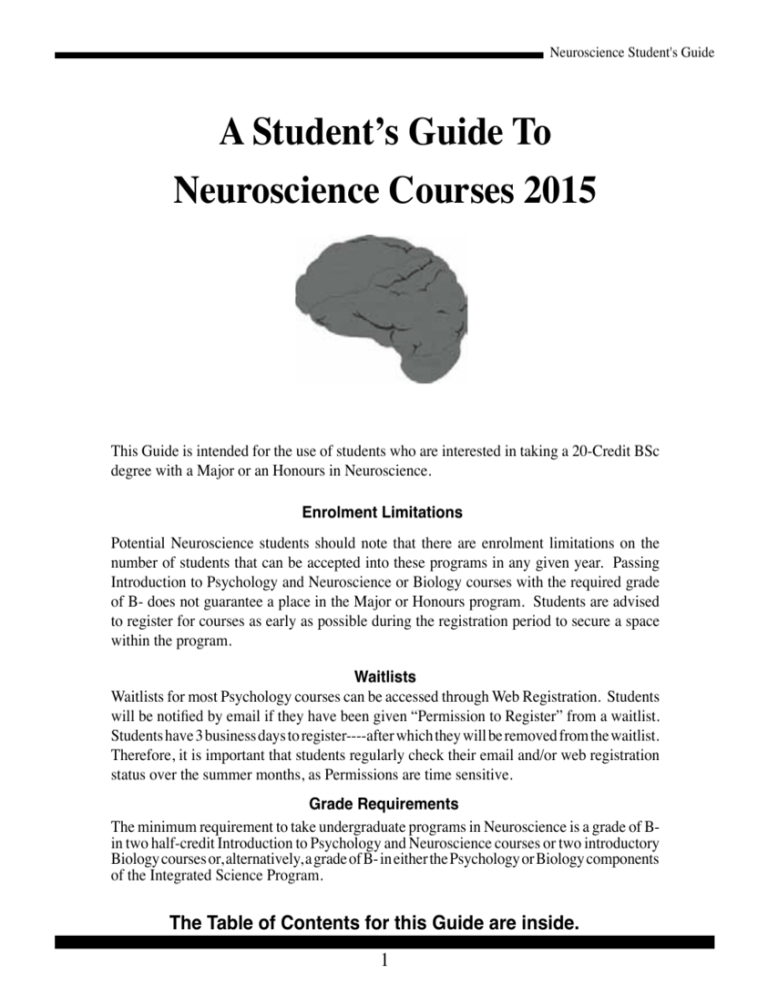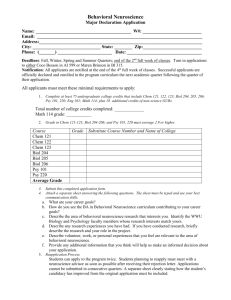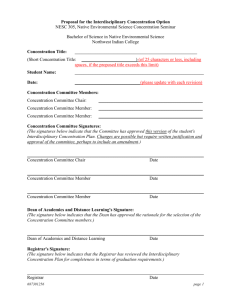2014 NESC guide.indd - Dalhousie University
advertisement

Neuroscience Student's Guide A Student’s Guide To Neuroscience Courses 2015 This Guide is intended for the use of students who are interested in taking a 20-Credit BSc degree with a Major or an Honours in Neuroscience. Enrolment Limitations Potential Neuroscience students should note that there are enrolment limitations on the number of students that can be accepted into these programs in any given year. Passing Introduction to Psychology and Neuroscience or Biology courses with the required grade of B- does not guarantee a place in the Major or Honours program. Students are advised to register for courses as early as possible during the registration period to secure a space within the program. Waitlists Waitlists for most Psychology courses can be accessed through Web Registration. Students will be notified by email if they have been given “Permission to Register” from a waitlist. Students have 3 business days to register----after which they will be removed from the waitlist. Therefore, it is important that students regularly check their email and/or web registration status over the summer months, as Permissions are time sensitive. Grade Requirements The minimum requirement to take undergraduate programs in Neuroscience is a grade of Bin two half-credit Introduction to Psychology and Neuroscience courses or two introductory Biology courses or, alternatively, a grade of B- in either the Psychology or Biology components of the Integrated Science Program. The Table of Contents for this Guide are inside. 1 Neuroscience Student's Guide 2 Neuroscience Student's Guide Contents I. Degree Programs 20-Credit BSc with Honours in Neuroscience . . . . . . . . . . . . . . . . . . . . . . . . . . . . University Requirements . . . . . . . . . . . . . . . . . . . . . . . . . . . . . . . . . . . . . . . . . Departmental Requirements . . . . . . . . . . . . . . . . . . . . . . . . . . . . . . . . . . . . . . . Combined Honours Degree . . . . . . . . . . . . . . . . . . . . . . . . . . . . . . . . . . . . . . . 20-Credit BSc with Major in Neuroscience . . . . . . . . . . . . . . . . . . . . . . . . . . . . . . University Requirements . . . . . . . . . . . . . . . . . . . . . . . . . . . . . . . . . . . . . . . . . Departmental Requirements . . . . . . . . . . . . . . . . . . . . . . . . . . . . . . . . . . . . . . . Double Major . . . . . . . . . . . . . . . . . . . . . . . . . . . . . . . . . . . . . . . . . . . . . . . . . . Minor Program . . . . . . . . . . . . . . . . . . . . . . . . . . . . . . . . . . . . . . . . . . . . . . . . . . . Minor Programs available to students in Major or Honours . . . . . . . . . . . . . . . . . Minor Programs in the Faculty of Science . . . . . . . . . . . . . . . . . . . . . . . . . . Minor Programs in the Faculty of Arts and Social Science . . . . . . . . . . . . . Minor Programs in outside Faculties . . . . . . . . . . . . . . . . . . . . . . . . . . . . . . II. Certificate in Animal Behaviour . . . . . . . . . . . . . . . . . . . . . . . . . . . . . . . . III. Grades for Honours Students . . . . . . . . . . . . . . . . . . . . . . . . . . . . . . . . . . IV. Transfer Students . . . . . . . . . . . . . . . . . . . . . . . . . . . . . . . . . . . . . . . . . . . . V. What is the Grading System? . . . . . . . . . . . . . . . . . . . . . . . . . . . . . . . . . . VI. Departmental Fees and Charge . . . . . . . . . . . . . . . . . . . . . . . . . . . . . . . . VII. Courses Offered in Neuroscience. . . . . . . . . . . . . . . . . . . . . . . . . . . . . . . . VIII. Prerequisites . . . . . . . . . . . . . . . . . . . . . . . . . . . . . . . . . . . . . . . . . . . . . . . VIIII. Course Listings . . . . . . . . . . . . . . . . . . . . . . . . . . . . . . . . . . . . . . . . . . . . . . . 3 4 4 4 5 7 7 8 9 10 11 11 11 12 13 14 14 14 15 15 15 16 Neuroscience Student's Guide I. Degree Programmes 20-Credit BA or BSc with Honours in Neuroscience University Requirements: Admission to the Honours programme requires approval of both the Psychology Department and the Registrar. Students must obtain an application to enter the Honours program from the Registrar, and usually apply in January of their third year of study. Students taking an Honours degree in Neuroscience cannot use cross-listed Psychology courses as electives. 1. Four years—21 full credits are required. All credits must be from the College of Arts and Science (except for electives described in the Academic Calendar). 2. Students normally complete within their first 10 credits one full credit, or 2 half credits, in each of the three subject groupings specified in the Academic Calendar (Languages and Humanities, Social Sciences, Life Sciences and Physical Sciences). 3. All BA and BSc. students must complete one full credit in Mathematics (not MATH 1001, 1002, 1003, 1110, 1115 OR 1120). 4. After the first year, at least 9, and no more than 11 full credits in Neuroscience (beyond the introductory level) must be taken. A grade of C or better must be obtained in all Neuroscience credits. 5. After completing the 5 first-year credits, BA students must take at least 2 full credits in a single subject other than Neuroscience and at least 1 full credit in a third different subject. A minimum grade of C is required in the credits taken. BSc students are required to take 4-6 full credits in subjects other than Psychology and Neuroscience. 6. In the fourth year, Honours students receive a 21st grade (the Honours Qualifying Examination) based on the quality of the Honours thesis. This is a Pass/Fail grade. 7. Consult sections on Honours programs in the Academic Calendar, for additional details. Departmental Requirements: Students interested in taking an Honours degree in Neuroscience should follow the course sequence specified for Honours students. They should consult with an honours advisor in January of their third year and complete departmental application forms. Admissions to Honours in January will require a grade of B or better in NESC 2007 and an A- average in the last six completed Neuroscience half credits. Applications may be delayed until the end of the third year, in which case, a grade of B or better in NESC 2007 and an A-average in the last nine completed Neuroscience half credits will be required. Potential Honours students should try to locate a thesis advisor and begin laying the ground work for their thesis research (e.g., background reading, acquiring laboratory methodology) as early as possible in their third year. A detailed description of the Honours application process may be found on the departmental website: www.dal.ca/ psychandneuro. 4 Neuroscience Student's Guide 1000 level: • MATH 1000.03 (preferred) or MATH 1215.03 • One other half credit in Mathematics (preferably, but not necessarily, MATH 1010.03) • BIOL 1010.03 or 1020.03 and BIOL 1011.03 or 1021.03 (with a grade of B- or better) • CHEM 1011.03/1012.03 • Either PSYO 1011.03 or 1021.03 and PSYO 1012.03 or 1022.03 or PHYC 1280.03/1290.03 or 1300X/Y.06 • Or, in lieu of the above, SCIE 1515X/Y.36, 1520X/Y.30, or 1540X/Y.27 Students are strongly recommended to take both PSYO 1011.03/1012.03 or PSYO 1021.03/1022.03 and PHYC 1280.03/1290.03 or 1300X/Y.06 prior to finishing their degree. 2000 level: • NESC 2007.03 • NESC 2470.03 • NESC 2570.03 • PSYO 2501.03 (or STAT 2080.03). • BIOL 2020.03 • Two half credits selected from: NESC 2130.03, 2140.03, 2150.03, 2160.03, BIOC 2300.03, BIOL 2030.03, PHYC 2250.03. 3000 level: • Two half credits of laboratory courses selected from NESC 3044.03, 3051.03, 3137.03, 3161.03, 3370.03, 3371.03, 3440.03, 3775.03 • PSYO 3502.03 • Two additional half credits selected from NESC 3043.03, 3052.03, 3131.03, 3132.03, 3133.03, 3134.03, 3162.03, 3165.03, 3170.03, 3180.03, 3190.03, 3227.03, 3237.03, 3260.03, 3264.03, 3270.03, 3670.03, 3770.03, 3790.03, 3970.03, BIOC 3200.03, BIOL 3020.03 4000 level: • NESC 4500X/Y.06 • Two half credits selected from NESC 4000.03, 4007.03, 4050.03, 4070.03, 4130.03, 4160.03, 4170.03, 4177.03, 4185.03, 4230.03, 4374.03, 4376.03, 4740.03 • Two half credits of NESC 3000- or 4000-level courses. • Honours Qualifying Exam NOTES: In designing the first year of study, students should consider the requirements for their BSc degree as outlined in Section I of the Degree Requirements. Combined Honours Degree It is possible for students to take an Honours degree combining Neuroscience with another Science subject (other than Psychology). To do so, students must take a minimum of 11 and a maximum of 13 full credits above the 1000 level in the two departments in the second, third and fourth years of study. No more than 7 of the 11 (or 9 of the 13) credits can be from one department. BA students must completed two half credits 5 Neuroscience Student's Guide in a single subject other than Neuroscience and the second selected subject in years 2, 3 & 4. Students proposing to undertake combined honours must consult with an Honours advisor in both departments to arrange program details. The program must be approved by both departments and the Registrar. A grade of C or better is required in all primary and secondary subject courses. If Neuroscience is chosen as the primary subject in a Combined Honours degree, the following courses are required. 1000 level: • MATH 1000.03 (preferred) or MATH 1215.03 • One other half credit in Mathematics (preferably, but not necessarily, MATH 1010.03) • BIOL 1010.03 or 1020.03 and BIOL 1011.03 or 1021.03 (with a grade of B- or better) • CHEM 1011.03/1012.03 • PSYO 1011.03 or 1021.03 and PSYO 1012.03 or 1022.03 or PHYC 1280.03/1290.03 or 1300X/Y.06 with a B- or better • Or, in lieu of the above, SCIE 1505X/Y.18, 1515X/Y.36, 1520X/Y.30, or 1540X/Y.27 with a B- in the Psychology or Biology component. Students are strongly recommended to take both PSYO 1011.03 or 1021.03 and PSYO 1012.03 or 1022.03 and PHYC 1280/1290 or 1300X/Y.06 prior to finishing their degree. 2000 level: • NESC 2007.03 • NESC 2470.03 • NESC 2570.03 • PSYO 2501.03 (or STAT 2080.03) • BIOL 2020.03* • One half credit selected from: NESC 2130.03, 2140.03, 2150.03, 2160.03, BIOC 2300.03, BIOL 2030.03, PHYC 2250.03 3000 level: • Two half credits of laboratory courses selected from NESC 3044.03, 3051.03, 3137.03, 3161.03, 3370.03, 3371.03, 3440.03, 3775.03 • PSYO 3502.03 • At least one additional half credit selected from NESC 3043.03, 3052.03, 3131.03, 3132.03, 3133.03, 3134.03, 3162.03, 3165.03, 3170.03, 3180.03, 3190.03, 3227.03, 3237.03, 3260.03, 3264.03, 3270.03, 3670.03, 3770.03, 3790.03, 3970.03, BIOC 3200.03, BIOL 3020.03 4000 level: • NESC 4500X/Y.06 • Two half credits selected from NESC 4000.03, 4007.03, 4050.03, 4070.03, 4130.03, 4160.03, 4170.03, 4177.03, 4185.03, 4230.03, 4374.03, 4376.03, 4740.03 • Honours Qualifying Exam 6 Neuroscience Student's Guide If Neuroscience is chosen as the secondary subject in a Combined Honours degree, the following secondand third-year courses are required. 2000 level: • NESC 2007.03 • NESC 2470.03 • NESC 2570.03 • PSYO 2501.03 (or STAT 2080.03) • BIOL 2020.03* 3000/4000 level: • Two half credits of laboratory courses selected from NESC 3044.03, 3051.03, 3137.03, 3161.03, 3370.03, 3371.03, 3440.03, 3775.03 • One additional full credit (or two half credits) in Neuroscience courses at the 3000/4000 level. *If students undertake, as part of a Combined Honours degree, another program of study that requires BIOL 2020.03, they should substitute another half-credit elective in a Neuroscience topic at the 2000 level for BIOL 2020.03. If you have any questions regarding a Combined Honours program, you should consult one of the Neuroscience Honours student advisors. 20-Credit BA or BSc with Major in Neuroscience University Requirements: 1. Four years—20 full credits are required. All credits must be from the College of Arts and Science (except for electives described in the Academic Calendar). 2. At least 12 credits of the 20 full credits must be beyond the 1000 level. 3. Students normally complete within their first 10 credits one full credit, or 2 half credits, in each of the three subject groupings specified in the Calendar (Languages and Humanities, Social Sciences, Life Sciences and Physical Sciences). 4. All students must complete one full credit in Mathematics (not MATH 1001, 1002, 1003, 1110, 1115 OR 1120). 5. BA students must take at least 7 and no more than 9, full credits in Neuroscience courses numbered 2000 and above. BSc students must take at least 7 full credits or half credit equivalents) in courses numbered 2000 and above. 6. At least 4 full credits in third- or fourth-year Neuroscience courses are required. 7. After completing the 5 first-year credits, BA students must take at least one full credit in each of two subjects other than Neuroscience. 8. Consult sections on Major programs in the Academic Calendar, for additional details. 7 Neuroscience Student's Guide Departmental Requirements: 1000 level: • MATH 1000.03 (preferred) or MATH 1215.03 • One other half credit in Mathematics (preferably, but not necessarily, MATH 1010.03) • BIOL 1010.03 or 1020.03 and BIOL 1011.03 or 1021.03 (with a grade of B- or better) • CHEM 1011.03/1012.03 • PSYO 1011.03 or 1021.03 and PSYO 1012.03 or 1022.03 with a B- or better • Or, in lieu of the above, SCIE 1505X/Y.18, 1515X/Y.36, 1520X/Y.30, or 1540X/Y.27 with a B- in the Psychology or Biology component Students are strongly recommended to take PHYC 1280.03/1290.03 or 1300X/Y.06 prior to finishing their degree. 2000 level: • NESC 2007.03 • NESC 2470.03 • NESC 2570.03 • PSYO 2501.03 (or STAT 2080.03). • BIOL 2020.03 • Two half credits selected from NESC 2130.03, 2140.03, 2150.03, 2160.03, BIOC 2300.03, BIOL 2030.03, PHYC 2250.03. 3000/4000 level: • Two half credits of laboratory courses selected from NESC 3044.03, 3051.03, 3137.03, 3161.03, 3370.03, 3371.03, 3440.03, 3775.03 • Two more half credits selected from NESC 3043.03, 3052.03, 3131.03, 3132.03, 3133.03, 3134.03, 3162.03, 3165.03, 3170.03, 3180.03, 3190.03, 3227.03, 3237.03, 3260.03, 3264.03, 3270.03, 3670.03, 3770.03, 3790.03, 3970.03, 4374.03, 4376.03 • Two additional full credits (or four half credits) in Neuroscience courses at the 3000/4000 level. Note: 1) The following can be counted as NESC courses: BIOC 2300.03, 3200.03, BIOL 2030.03, 3020.03, PHYC 2250.03. 2) In designing the first year of study, students should consider the requirements for their BSc degree as outlined in Section I of the Degree Requirements. 8 Neuroscience Student's Guide Double Major in Neuroscience It is possible for students to take a degree combining a Major in Neuroscience with another subject (other than Psychology) such as Biology or Biochemistry. If Neuroscience is chosen as the primary subject in a Double Major degree, the following courses are required. 1000 level: • MATH 1000.03 (preferred) or MATH 1215.03 • One other half credit in Mathematics (preferably, but not necessarily, MATH 1010.03) • BIOL 1010.03 or 1020.03 and BIOL 1011.03 or 1021.03 • CHEM 1011.03/1012.03 • PSYO 1011.03 or PSYO 1021.03 and PSYO 1012.03 or 1022.03 with a B- or better • Or, in lieu of the above, SCIE 1505X/Y.18, 1515X/Y.36, 1520X/Y.30, or 1540X/Y.27 with a B- in the Psychology or Biology component Students are strongly recommended to take PHYC 1100X/Y.06 or 1300X/Y.06 prior to finishing their degree. 2000 level: • NESC 2007.03 • NESC 2470.03 • NESC 2570.03 • PSYO 2501.03 (or STAT 2080.03) • BIOL 2020.03 3000/4000 level: • Two half credits of laboratory courses selected from NESC 3044.03, 3051.03, 3137.03, 3161.03, 3370.03, 3371.03, 3440.03, 3775.03 • Two more half credits selected from NESC 3043.03, 3052.03, 3131.03, 3132.03, 3133.03, 3134.03, 3162.03, 3165.03, 3170.03, 3180.03, 3190.03, 3227.03, 3237.03, 3260.03, 3264.03, 3270.03, 3670.03, 3770.03, 3790.03, 3970.03, 4374.03, 4376.03. • One additional full credit (or two half credits) in Neuroscience courses at the 3000/4000 level. Note: The following can be counted as NESC courses: BIOC 2300.03, 3200.03, BIOL 2030.03, 3020.03, PHYC 2250.03. 9 Neuroscience Student's Guide If Neuroscience is chosen as the secondary subject in a Double Major program, the following courses are required: 1000 level: • MATH 1000.03 (preferred) or MATH 1215.03 • One other half credit in Mathematics (preferably, but not necessarily, MATH 1010.03) • BIOL 1010.03 or 1020.03 and BIOL 1011.03 or 1021.03 • CHEM 1011.03/1012.03 • PSYO 1011.03 or 1021.03 and PSYO 1012.03 or 1022.03 with a B- or better • Or, in lieu of the above, SCIE 1505X/Y.18, 1515X/Y.36, 1520X/Y.30, or 1540X/Y.27 with a B- in the Psychology or Biology component Students are strongly recommended to take PHYC 1280.03/1290.03 or 1300X/Y.06 prior to finishing their degree. 2000 level: • NESC 2007.03 • NESC 2470.03 • NESC 2570.03 • PSYO 2501.03 (or STAT 2080.03). • BIOL 2020.03* *If students undertake, as part of a Double Major degree, another program of study that requires BIOL 2020.03, they should substitute another half-credit elective in a Neuroscience topic at the 2000 level for BIOL 2020.03. 3000/4000 level: • Two half credits of laboratory courses selected from NESC 3044.03, 3051.03. 3137.03, 3161.03, 3370.03, 3371.03, 3440.03, 3775.03 • One additional full credit (or two half credits) in Neuroscience courses at the 3000/4000 level. Neuroscience Minor Students in 20 credit degree programs other than Neuroscience and Psychology may choose to complete a Minor Program in Neuroscience. A Minor in Neuroscience is offered to students enrolled in other programs within the Faculty of Science and to students from other faculties, provided they complete any three full credits in Neuroscience courses above the 1000 level. Note that if a Minor is added to a Double Major or a Combined Honours program, students may find that they need to take more than 20 credits to complete all of their degree requirements. 10 Neuroscience Student's Guide Outside Minor Programs available to students enrolled in Major or Honours Neuroscience programs Minor programs allow students to develop subject specialities outside their main subject of study. Minors are normally added to a four-year (20-credit) Major or Honours program. A student enrolled in a Major or Honours Psychology program may enroll in any of the Minors offered by other programs in the Faculty of Science, or in Minors offered by other Faculties. Minor Programs offered by the Faculty of Science Minor in Biochemistry and Molecular Biology (BA, BSc) Minor in Biology (BA, BSc) Minor in Chemistry (BA, BSc) Minor in Earth Sciences (BA, BSc) Minor in Economics (BA, BSc) Minor in Environmental Science (BA, BSc) Minor in Geography (BA, BSc) Minor in Marine Biology (BA, BSc) Minor in Mathematics (BA, BSc) Minor in Microbiology & Immunology (BA, BSc) Minor in Neuroscience (BA, BSc) Minor in Oceanography (BA, BSc) Minor in Physics and Atmospheric Science (BA, BSc) Minor in Psychology (BA, BSc) Minor in Statistics (BA, BSc) Minor Programs offered by the Faculty of Arts and Social Sciences/King’s Minor in American Studies Minor in Applied Ethics Minor in Arabic Studies Minor in Bioethics Minor in Canadian Studies Minor in Chinese Studies Minor in Courseical Literature Minor in Contemporary Studies Minor in Critical Health Studies Minor in Development Studies Minor in Early Modern Studies Minor in Economy, Work & Development Minor in Environment, Sustainability & Society Minor in English Minor in Film Studies 11 Neuroscience Student's Guide Minor in French Minor in Gender and Women’s Studies Minor in Geography Minor in German Philosophy Minor in Health Studies Minor in Hispanic Cultures Minor in Hispanic Literature Minor in the History of Science and Technology Minor in Italian Studies Minor in Latin American Studies Minor in Law and Society Minor in Middle Eastern Studies Minor in Philosophy Minor in Philosophy of Mind and Cognitive Science Minor in Philosophy of Science Minor in Political Science Minor in Popular Culture Studies Minor in Russian Studies Minor in Social Justice & Inequality Minor in Sociology and Social Anthropology Minor in Spanish Language Minor in Theatre Minor Programs offered by Faculties outside the College of Arts and Science Minor in Business (BA, BSc) (Faculty of Management) Minor in Community Design (BA, BSc) (Faculty of Architecture and Planning) Minor in Computer Science (BSc only)(Faculty of Computer Science) Minor in Food Science (BSc only) (Faculty of Engineering) Minor in Geography (BA, BSc) (Faculties of Science, Arts and Social Science, Architecture and Planning) Minor in the History of Science and Technology(BA, BSc) (King’s) Minor in Journalism Studies (BA, BSc) (King’s) Minor in Law and Society (BA, BSc) (Faculties of Law and Arts and Social Science) Minor in Management (BA, BSc) (Faculty of Management) 12 Neuroscience Student's Guide II. Certificate in Animal Behaviour The certificate program is a collaborative effort of both the Biology and Psychology departments. It provides students an opportunity to take, within their B.A. or B.Sc. Honours or Major program, a set of courses and a research project that will accord them an animal behavior specialization. Completion of the Certificate will be noted at convocation and shown on a student’s transcript. Note: It is the responsibility of students in the Certificate Program to complete the course sequence specified, and to provide the Certificate Coordinator with confirmation that the necessary courses have been taken, by the end of the examination period in their final year of study. Certificate requirements: 1. A minimum grade of a B- is required in four mandatory courses: NESC/PSYO 2160.03 Animal Behaviour PSYO 2501.03 Statistical Methods I or STAT 2080.03 Statistical Methods for Data Analysis and Inference BIOL 3062.03 Behavioral Ecology or BIOL 3630.03 Field Methods in Animal Behaviour or NESC/PSYO 3161.03 Measuring Behaviour 2. A grade of B- in two full credits of elective courses chosen from the following list. One of the two-full credits must be at the 3000/4000 level. 2000 Level ANSC 2003.03 Companion Animal Behaviour NESC/PSYO 2140.03 Learning NESC/PSYO 2470.03 Systems Neuroscience 3000 Level BIOL 3327.03 Entomology BIOL 3622.03 Ornithology BIOL 3067.03 Ecology and Evolution of Fishes BIOL 3626.03 Field Studies of Marine Mammals MARI 3632.03 Field Studies of Marine Mammals NESC/PSYO 3000.06 Independent Research in Modern Psychology (Animal Behaviour topic) NESC/PSYO 3001.03 Directed Research Project in Psychology (Animal Behaviour topic) NESC/PSYO 3043.03 Neurobiology and Learning NESC/PSYO 3044.03 Laboratory Methods of Learning and Conditioning NESC/PSYO 3162.03 Advanced Animal Behaviour (subject to approval) NESC/PSYO 3165.03 Neuroethology NESC/PSYO 3170.03 Hormones and Behaviour NESC/PSYO 3180.03 Psychoneuroimmunology/Ecological Immunology NESC/PSYO 3670.03 Genes, Brain and Behaviour 13 Neuroscience Student's Guide 4000 Level NESC/PSYO 4160.03 Topics in Behavioural Biology BIOL 4060.03 Marine Mammalogy BIOL 4232.03 Biologging and Biotelemetry BIOL 4800.06 Special topics (Animal Behaviour topic) BIOL 4804.03, 4806.03, 4807.03 Special topics (Animal Behaviour topic) 3. A grade of B- in one half credit or more of independent research in Animal Behaviour. The research topic must be pre-approved by the Certificate Coordinator prior to the start of their research course (i.e. NESC/PSYO 3000.06, NESC/PSYO 3001.03, NESC/PSYO 4500.06, BIOL 4800.06, BIOL 4806.03, BIOL 4807.03, or BIOL 4900.06). Honours students are encouraged to complete their Honours thesis on a topic in Animal Behaviour to fulfill this requirement. Students are also encouraged to further develop their study design and analysis skills by taking additional courses such as BIOL 4061.03 (Design of Biological Experiments) or BIOL 4062.03 (Analysis of Biological data). 4. Enrollment in the ‘Certificate in Animal Behaviour’ program should be undertaken by students in their third or fourth year of studies when they are seeking approval of the research topic by the Certificate Coordinator. The Certificate Coordinator will be named by the Animal Behaviour Working Group (S. Adamo, S. Gadbois, A. Horn, M. Leonard, C. Staicer). III. Grade Requirements for Neuroscience honours programs Grades for students in the Honours program: A cumulative GPA 3.00 (B) is required to graduate. No grades less than a C (no C- or D grades) are acceptable in required Neuroscience Honours program courses. An A- is required for a first-course degree. Grades for students in Major Programs: A cumulative GPA of 2.0 ( C ) is required to graduate. IV. Transfer Students Transfer credits will be granted for credits from other universities if they are comparable to Dalhousie credits. Consult the Registrar’s Office (p. 31, Section 7) to determine what credits can be transferred and see Dr. B. Earhard if departmental information is required. V. What is the Grading System? In each course the work requirements and the examination systems differ. You will be told how you will be graded in each course during the first week of the course. 14 Neuroscience Student's Guide VI. Departmental Fees and Charges The Psychology Department does not levy any fees for laboratory instruction or materials used in laboratories. Some instructors do, however, provide laboratory manuals or copied course notes for which students are expected to pay as they would for textbooks in any course. The Faculty of Science does levy an Auxiliary Fee for all laboratory or skills courses; this fee is paid at the time tuition fees are paid. VII. Courses Offered in Neuroscience Because of staff changes, sabbatical leaves, and University cut-backs not every course listed in the University Calendar can be offered every year. Section VIII gives the title of each course, the course format, credit, name of instructor(s), and prerequisites. The 4000-level seminars are intended for fourth-year Honours students, but third-year Honours students may enroll with the permission of the professor. VIII. Prerequisites A full credit of Introduction to Psychology and Neurosciences courses (PSYO 1011.03/1012.03 or PSYO 1021.03/1022.03) is the prerequisite for all 2000-level courses except for NESC 2160, 2170 and 2470 (prerequisite: BIOL 1010.03/1011.03 or BIOL 1020.03/1021.03, and/or PSYO 1011.03/1012.03 or PSYO 1021.03/1022.03 or SCIE 1502X/Y.21). SCIE 1501X/Y.27, 1503X/Y.21, 1504X/Y.27, or 1510X/Y.33 is the prerequisite for students in the Dalhousie Integrated Science Program (DISP). A minimum grade of B- is required in all of the above courses for admission into NESC courses numbered 2000 and above. 15 Neuroscience Student's Guide IX. Course Listings In 2006/2007, our full-credit Introduction to Psychology and Neuroscience courses were divided into two half-credit courses. PSYO 1000X/Y.06 became PSYO 1021.03 and 1022.03, and PSYO 1001X/Y.06 became PSYO 1011.03 and 1012.03. If a course now requires PSYO 1011.03 and 1012.03 or PSYO 1021.03 and 1022.03 as prerequisites, this requirement may also be met by either PSYO 1000.06 or PSYO 1001.06. PSYO 1011.03 Introduction to Psychology and Neuroscience I: From Neuron to Person—lecture & tutorial lab. Dr. Stevens (Coordinator), other staff members and PSYO/NESC 3010 tutors. PSYO 1012.03 Introduction to Psychology and Neuroscience II: From Social Interaction to Psychopathology—lecture & tutorial lab. Dr. Stevens (Coordinator), other staff members and PSYO/NESC 3010 tutors. PSYO 1021.03 Introduction to Psychology and Neuroscience I: From Neuron to Person—lecture. PSYO 1022.03 Introduction to Psychology and Neuroscience II: From Social Interaction to Psychopathology—lecture. NESC 2007.03 Neuroscience Principles and Methods—lecture & lab. PSYO 1011/1012 or 1021/1022, or SCIE 1505X/Y.18, 1515X/Y.36, 1520X/Y.30, or 1540X/Y.30 or BIOL 1010 or 1020 and 1011 or 1021 (with a grade of B- or better). NESC 2130.03 Introduction to Cognitive Psychology—lecture. PSYO 1011/1012 or 1021/1022, or SCIE 1505X/Y.18, 1515X/Y.36, 1520X/Y.30, or 1540X/Y.30 (with a grade of B- or better). NESC 2140.03 Learning—lecture. PSYO 1011/1012 or 1021/1022, or SCIE 1505X/Y.18, 1515X/Y.36, 1520X/Y.30, or 1540X/Y.30 NESC 2150.03 Perceptual Processes—lecture. PSYO 1011/1012 or 1021/1022, or SCIE 1505X/Y.18, 1515X/Y.36, 1520X/Y.30, or 1540X/Y.30 (with a grade of B- or better), or BIOL 1010 or 1020 and 1011 or 1021. NESC 2160.03 Animal Behaviour—lecture. PSYO 1011/1012 or 1021/1022, or SCIE 1505X/Y.18, 1515X/Y.36, 1520X/Y.30, or 1540X/Y.30 or BIOL 1010 or 1020 and 1011 or 1021 (with a grade of B- or better). NESC 2470.03 Systems Neuroscience—lecture. NESC/PSYO 2570.03 or instructor's consent. PSYO 2501.03 Statistical Methods I—lecture. Concurrent registration in PSYO 2000 or NESC 2007, or instructor's consent. NOTE: PSYO 2501.03 does not fulfil any part of the Faculty of Science Mathematics requirement. NESC 2570.03 Cellular Neuroscience—lecture. PSYO 1011/1012 or 1021/1022, or SCIE 1505X/Y.18, 1515X/Y.36, 1520X/Y.30, or 1540X/Y.27 or BIOL 1010/1011 or BIOL 1020/1021 (with a grade of B- or better) 16 Neuroscience Student's Guide NESC 3000.06 Independent Research in Modern Neuroscience—independent research. Individual supervisors—Coordinated by Dr. Stamp. PSYO 2000 or NESC 2007 or NESC/PSYO 2470 and previous or concurrent enrolment in two other 3000-level courses, and coordinator's consent. NESC 3001.03 Directed Research Project in Neuroscience—independent research. Individual supervisors—Coordinated by Dr. Stamp. PSYO 2000 or NESC 2007 or NESC/PSYO 2470, PSYO 2501 or STAT 2080, and previous or concurrent enrolment in two other 3000-level courses, and coordinator's consent. NESC 3010.06 Advanced General Psychology—lecture & tutors for PSYO 1011/1012. PSYO 2000 or NESC 2007, advanced courses in NESC/PSYO, and instructor's consent. NESC 3043.03 Neurobiology of Learning—lecture. PSYO 2000 or NESC 2007, and either NESC/ PSYO 2140 or NESC/PSYO 2470 or PSYO 2770. NESC 3044.03 Laboratory Methods of Learning and Conditioning—lecture & lab. PSYO 2000 or NESC 2007, PSYO 2501 or STAT 2080, and either NESC/PSYO 2140 or NESC/ PSYO 2470 or PSYO 2770. NESC 3051.03 Sensory Neuroscience I. Vision—lecture & lab. PSYO 2000 or NESC 2007, and either NESC/PSYO 2150 or 2470 or PSYO 2770. NESC 3052.03 Sensory Neuroscience II. Hearing and Speech—lecture. PSYO 2000 or NESC 2007, and NESC/PSYO 2470. NESC 3131.03 Research Methods in Attention—lecture & lab. PSYO 2000 or NESC 2007, PSYO 2501 or STAT 2080, and one of NESC/PSYO 2130 or 2150, or 3005. NESC 3132.03 Research Methods in Visual Cognition—lecture & lab. PSYO 2000 or NESC 2007, PSYO 2501 or STAT 2080, and one of NESC/PSYO 2130 or 2150, or 3005. NESC 3133.03 Research Methods in Memory—lecture & lab. PSYO 2000 or NESC 2007, PSYO 2501 or STAT 2080, and NESC/PSYO 2130. NESC 3134.03 Research Methods in Psycholinguistics—lecture & lab. PSYO 2000 or NESC 2007, PSYO 2501 or STAT 2080, and NESC/PSYO 3190. NESC 3137.03 Research Methods in Cognitive Neuroscience—lecture & lab. PSYO 2000 or NESC 2007, PSYO 2501 or STAT 2080, and NESC/PSYO 2130. NESC 3161.03 Measuring Behaviour—lecture and lab. PSYO 2000 or NESC 2007. NESC 3162.03 Advanced Animal Behaviour—lecture. PSYO 2000 or NESC 2007 or BIOL 3062 or 3630 and NESC/PSYO 2160. NESC 3165.03 Neuroethology—lecture & lab. NESC/PSYO 2160 or BIOL 3062; and NESC/PSYO 2570 or BIOL 3070 or MARI 3071; and PSYO 2000 or NESC 2007 or one of the following Biology courses: 2003, 2004, 2020, 2030, 2060. NESC 3170.03 Hormones and Behaviour—lecture. PSYO 2000 or NESC 2007, and PSYO/NESC 2470 or PSYO 2770 or BIOL 1010 or 1020 and BIOL 1011 or 1021. 17 Neuroscience Student's Guide NESC 3180.03 Psychoneuroimmunology/Ecological Immunology—lecture. PSYO 2000 or NESC 2007 and either PSYO 2770 or PSYO/NESC 2470 or MICI 2100; or BIOL 2020. NESC 3190.03 Psycholinguistics—lecture. PSYO 2000 or NESC 2007, and NESC/PSYO 2130. NESC 3227.03 Principles of Human Neuropsychology—lecture. PSYO 2000 or NESC 2007, and NESC/PSYO 2470 or PSYO 2770; NESC/PSYO 2130 is helpful. NESC 3237.03 Drugs and Behaviour—lecture. PSYO 2000 or NESC 2007, and one of PSYO/NESC 2170, 2470, 2570 or PSYO 2770. NESC 3260.03 Biological Rhythms—lecture. PSYO 2000 or NESC 2007 or BIOL 1010 or 1020 and BIOL 1011 or 1021 and one of PSYO/NESC 2170 or 2470. NESC 3264.03 The Science of Sleep—lecture. PSYO 2000 or NESC 2007, and either PSYO 2770 or PSYO/NESC 2470; or BIOL 2020. NESC 3270.03 Developmental Neuroscience—lecture. PSYO 2000 or NESC 2007, and NESC/ PSYO 2470 and 2570. NESC 3370.03 Neuroscience Laboratory I—lab. PSYO 2000 or NESC 2007, NESC/PSYO 2470 and 2570, or NESC/PSYO 3270. NESC 3371.03 Neuroscience laboratory II—lab. PSYO 2000 or NESC 2007, NESC/PSYO 2470 and 2570, or NESC/PSYO 3270. NESC 3440.03 Neuroanatomy—lecture/lab. BIOL 2020 or instructor's consent. PSYO 3502.03 Statistical Methods II—lecture & skills lab. PSYO 2000 or NESC 2007 and PSYO 2501 or STAT 2080. NESC 3670.03 Genes, Brain and Behaviour—lecture. NESC/PSYO 2470 or PSYO 2770, and BIOL 1010/1011 or BIOL 1020/1021 or SCIE 1501, 1502, 1503, 1504 or 1510; BIOL 2020 and BIOL 2030 are useful. NESC 3770.03 Behavioural Neuroscience—lecture. PSYO 2007 or NESC 2007, and NESC/PSYO 2470 or PSYO 2770. NESC 3775.03 Behavioural Neuroscience Laboratory—research lab. PSYO 2000 OR NESC 2007, PSYO/NESC 2470, OR PSYO 2770, PSYO 2501 and one of PSYO/NESC 2160, 2170, 3237 or 3770 and instructor’s consent. NESC 3790.03 Neurolinguistics—lecture. NESC/PSYO 2470 or PSYO 2770. NESC 3970.03 Molecular Neuroscience—lecture. NESC/PSYO 2570. NESC 4000.03 Senior Seminar—seminar. Coordinated by Dr. Stamp—Fourth-year Honours students and instructor's consent. NESC 4007.03 Contemporary Issues in Neuroscience—seminar. Fourth-year Honours students and instructor's consent. NESC 4050.03 Topics in Perception—seminar. Fourth-year Honours students who have taken NESC/PSYO 3051 and instructor's consent. 18 Neuroscience Student's Guide NESC 4070.03 Chemical Neurobiology—seminar. Fourth-year Honours students who have taken NESC/PSYO 2470, 2570 or 3270, or instructor's consent. NESC 4130.03 Topics in Human Information Processing—seminar. Fourth-year Honours students and instructor's consent. NESC 4160.03 Topics in Behavioural Biology—seminar. Fourth-year Honours students and instructor's consent. NESC 4170.03 Topics in Behavioural Neuroendocrinology—seminar. Fourth-year Honours students and instructor's consent. NESC 4177.03 Theoretical Neuroscience—seminar. Intended for third or fourth year Neuroscience students. Permission of the instructor is required. NESC 4185.03 Synaptic Function—seminar. NESC 2570 or PHYL 2577, or permission of the course director. NESC 4230.03 Human Performance Topics—seminar. Fourth-year honours students and instructor's consent. NESC 4374.03 Introduction to Pharmacology I—lecture. Previous course in Physiology or Biochemistry is recommended. NESC 4376.03 Introduction to Pharmacology II—lecture. NESC 4374 (with grade of B or better) and instructor's consent. NESC 4500.06 Honours Thesis—research project. Coordinators (Drs. McMullen and Perrot) and individual supervisors — Honours students in their graduating year. NESC 4740.03 Topics in the Neurobiology of Learning and Memory—seminar. Fourth-year Honours students who have taken NESC/PSYO 2470.03 and 2140 and instructor's consent. 19 Neuroscience Student's Guide Prepared by the Department of Psychology Dalhousie University January 2015 Comments and suggestions to improve the usefulness of this Guide are welcome. Please address all such suggestions to the Chair, Undergraduate Program Committee. 20






